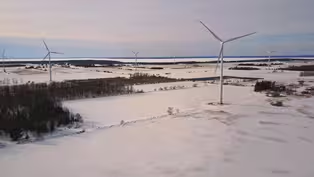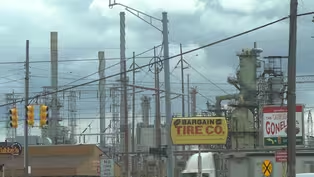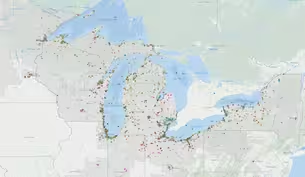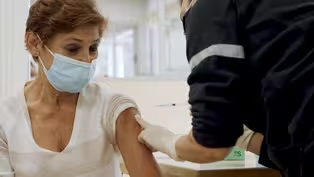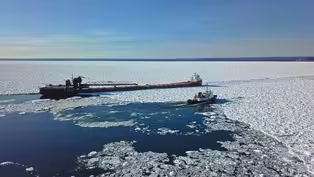
The Great Lakes Agenda
Season 1 Episode 21 | 26m 46sVideo has Closed Captions
The White House and the U.S. Senate change hands. What will it mean for the Great Lakes?
The White House and the U.S. Senate have changed hands, and the federal government may move in a new — and in some ways dramatically different — direction. What does the future look like for the Great Lakes with Joe Biden in the Oval office? The economy, the environment, the climate and our health hang in the balance.
Problems playing video? | Closed Captioning Feedback
Problems playing video? | Closed Captioning Feedback
Great Lakes Now is a local public television program presented by Detroit PBS

The Great Lakes Agenda
Season 1 Episode 21 | 26m 46sVideo has Closed Captions
The White House and the U.S. Senate have changed hands, and the federal government may move in a new — and in some ways dramatically different — direction. What does the future look like for the Great Lakes with Joe Biden in the Oval office? The economy, the environment, the climate and our health hang in the balance.
Problems playing video? | Closed Captioning Feedback
How to Watch Great Lakes Now
Great Lakes Now is available to stream on pbs.org and the free PBS App, available on iPhone, Apple TV, Android TV, Android smartphones, Amazon Fire TV, Amazon Fire Tablet, Roku, Samsung Smart TV, and Vizio.
Providing Support for PBS.org
Learn Moreabout PBS online sponsorship- [Announcer] On this edition of Great Lakes Now - The people of this nation have spoken.
- [Narrator] The White House and the Senate change hands.
- They have delivered us a clear victory.
- [Narrator] What will it mean for the issues facing the Great Lakes and for the people of our region?
- If there was investment from Washington, it would really move the needle.
- There is no way we can solve the problems without strong American leadership.
- We have to come to the realization that there is going to be a new normal.
(upbeat music) - [Announcer] This program is brought to you by: The Fred A. and Barbara M. Erb Family Foundation; The Charles Stewart Mott Foundation; Laurie & Tim Wadhams; The Consumers Energy Foundation is committed to serving Michigan, from preserving our state's natural resources and sustaining our future to continuing business growth, academic achievement, and community involvement.
Learn more at consumersenergy.com/foundation.
The Richard C. Devereaux Foundation for Energy and Environmental Programs at DPTV; The Polk Family Fund; Eve & Jerry Jung; The Brookby Foundation; Founders Brewing Company, and viewers like you.
Thank You 14.
- Hi, I'm Ward Detwiler.
Welcome back to Great Lakes Now.
There's new leadership in Washington, D.C.
In this show, we'll explore the changes we might expect to see with Joe Biden in the Oval Office.
We begin with the Great Lakes Restoration Initiative.
- [David] The Great Lakes Restoration Initiative, or GLRI, was created to protect and restore the largest system of fresh surface water in the world.
- Really over about five to six years, there was a great deal of effort to convince Washington that the Great Lakes are a national treasure.
President Obama came into office.
He had made it a priority in his campaign, and a bipartisan Congress signed off on the deal to create the Great Lakes Restoration Initiative, which went through in 2009.
- [David] Cameron Davis coordinated a Great Lakes interagency task force of eleven federal departments under the GLRI to address five focus areas: Toxic substances and areas of concern; invasive species; nonpoint source pollution impact on nearshore health; habitats and species; and foundations for future restoration actions.
- So there are things like trying to block invasive species, keep invasive species out of the Great Lakes, like Asian Carp.
Trying to clean up toxic hotspots.
These are working harbors and rivers around the Great Lakes that have seen what we call legacy pollutants be discharged over time into those waterways, trying to reduce polluted runoff that creates harmful or toxic algae, like the kind we've seen around Lake Erie is a real priority.
Rebuilding habitat is a priority and also working to help educate the public, and make sure that climate change does not undo the important work that's being done right now to restore the Great Lakes.
- [David] Since 2010, GLRI federal agencies have invested over $2.7 billion in more than 5,400 projects across all eight Great Lake States.
According to the EPA, of the 31 U.S. sites that were originally listed as areas of concern, 15 have been delisted or have achieved an all management actions complete status.
- Actually, I think we're going to wind up finishing the job of these clean ups really in the next 10 to 20 years.
There are many of us who thought that we may never see that day.
- [David] Funds to support the GLRI are appropriated to the Environmental Protection Agency, which provides funding for restoration projects.
The GLRI was originally funded under President Obama at $475 million.
The budget was reduced to $300 million for 2011, and it's stayed at about that level ever since.
In 2019, President Trump proposed a budget that would have reduced funding for the program by 90% from $300 million to $30 million.
Congress rejected the proposal, so the cuts never went into effect, and in March of that year, Trump reversed direction during a speech at a rally in Grand Rapids, Michigan.
- I support the Great Lakes.
Always have.
They're beautiful, they're big, very deep, record deepness, right?
And I'm going to get, in honor of my friends, full funding of $300 million for the Great Lakes Restoration Initiative.
- Dr. Alan Steinman is the director of the Annis Water Resources Institute at Grand Valley State University and a member of the Great Lakes Advisory Board that provides advice and recommendations to the EPA on GLRI projects.
- With the latest appropriations, it's going up to $475 million a year.
So in $25 million chunks it's going to be increased with each year, assuming that Congress actually appropriates that money each year.
So that's a really significant increase.
- [David] Aside from the environmental impacts, the GLRI's effect on the region's economy is significant.
- It's been shown through a number of economic studies, for every dollar you invest in restoration, large scale ecosystem restoration, there's a return on that investment of somewhere between three to one to six to one.
And so it makes good economic sense to restore these systems beyond just the spiritual and recreational and human health aspects associated with this.
- For more coverage of the Great Lakes Restoration Initiative, visit GreatLakesNow.org.
The EPA and other federal agencies are charged with safeguarding the environment, including the lakes, and there could be big changes from the new President.
- [Laura] Brian Kelly is an Emergency Responder with the U.S. EPA.
He's one of the first on the scene of a hazmat spill or an area of land polluted by heavy industry.
- And we need the enforcement staff to track down the successful corporations that are responsible for this contamination.
It's holding the companies responsible and saving the public money that we're having to spend to clean these sites up, and frankly it's just the right thing to do.
- [Narrator] But he says the job was made more difficult over the past four years.
The EPA's budget was slashed.
Staffing was cut by more than 20%.
Nicole Cantello is President of the Union representing about 1,000 Federal EPA workers in the Great Lakes Region.
- We are down a lot of people in the region and you can't enforce without enforcement personnel.
You can bring less cases against polluters, so then you can have less compliance with environmental laws, when there's less compliance with environmental laws, more pollution goes out into the Great Lakes.
- [Laura] The EPA did not respond to our request for a comment.
Howard Learner, CEO of the Environmental Policy Law Center based in Chicago agrees.
He's looking for the new administration to pursue environmental justice.
- A disproportionate amount of landfills, incinerators, polluting power plants have been located in lower income communities along the Great Lakes in the Midwest.
And as we know, lower income communities tend to be people of color.
That pollution has a disproportionate impact on people of color in lower income communities.
- [Laura] Jeremy Orr is a lawyer with the Natural Resources Defense Council in Chicago.
He hopes the Biden Administration will enable citizens to bring claims against polluters in their neighborhoods.
- In southwest Detroit where you have dozens of industrial polluters, butting up against residential neighborhoods.
And these folks have no kind of tangible legal policy to defend themselves from these discriminatory practices to allow communities to hold these polluters accountable, I think is a huge change in policy that we could see.
- [Narrator] While some might hope for the federal government to halt two controversial pipeline projects in the Great Lakes region, that intervention is unlikely.
Built in the 1960s by Canadian pipeline company Enbridge, Line 3 carries crude oil more than a thousand miles, from Alberta to Superior, Wisconsin.
- It crosses through tribal land.
It crosses through sort of a water rich region of Northern Minnesota near the Mississippi headwaters.
- [Laura] In 1991, a spill from Line 3 poured thousands of gallons of crude oil into surrounding wetlands near Grand Rapids, Minnesota.
Enbridge is replacing the pipeline now, but some worry about another spill.
- [Walker] And it is considered a risk to spilling in wild rice beds and important lakes where tribes hunt and fish and just sort of all around.
So it's definitely considered a major spill risk at this point.
- [Laura] These concerns notwithstanding, permits have been issued for Enbridge to replace Line 3, and construction has already begun.
Another controversial Enbridge pipeline, Line 5, runs beneath the Straits of Mackinac, where Lakes Michigan and Huron meet.
In November of 2020, Michigan Governor Gretchen Whitmer notified Enbridge that the pipeline's easement is being revoked, meaning the line would have to shut down by May of 2021.
Whitmer said Enbridge, quote, "has imposed on the people of Michigan an unacceptable risk of a catastrophic oil spill in the Great Lakes."
But two months later, an Enbridge vice president said the company had, quote, "no intention of shutting down" Line 5.
More court battles seem inevitable.
Enbridge has proposed a new pipeline that would run through a tunnel beneath the Straits, a project subject to federal approval.
The tunnel had seemed likely to remain a state issue, but as the conflict escalates, the federal intervention some environmentalists hope for could become more likely.
- You can find out more about environmental enforcement and the EPA's actions in our region at GreatLakesNow.org.
Of course the Biden administration will have to address COVID-19 and the economic effects of the pandemic.
How they do it could affect the health and prosperity of our region and the nation.
- [David] Today, roughly 107-million people live in the Great Lakes Region, putting a strain on an aging infrastructure.
Economists and civic leaders say rebuilding it is the path to economic recovery, but they warn things won't get better until COVID-19 is stamped out.
John Dickert is with the Alliance for Regional Development.
- And until we start working together and work together to make sure that we keep the pandemic down David vaccine is coming in, we're not gonna be able to rebuild this economy for quite some time.
- [Narrator] Mark Fisher, is President and CEO of the Council of the Great Lakes Region.
Fisher says the pandemic has been a major economic setback.
- And we started to see a bit of a rebound as the pandemic stabilized a little bit over the summertime in terms of economic activity and job creation, but I think by and large across the entire region, we're seeing the impact of the pandemic, both in terms of economic activity, but also job losses.
- [David] Those losses have caused long-term damage.
The University of Michigan Research Seminar for Quantitative Economics is forecasting that Michigan's economy will still be recovering in 2023.
One glimmer of hope is the Federal rollout of the COVID-19 vaccines.
How quickly they get administered could be a factor in the economic recovery.
Paula Gardner, Business Editor at Bridge-Michigan says it will be an unequal recovery.
- So people who are in lower wage and lower education type jobs are gonna have a much longer time before they actually recover.
Whereas somebody who is in a high wage job, high demand, those types of jobs are going to rebound much more quickly.
- [David] The Biden administration's recovery plan calls for $7 trillion in spending, including money to shore up the nation's aging infrastructure.
- There is no more jobs that you'll ever find in the world than rebuilding the country from the ground up.
- [Narrator] Kelly O'Brien is Executive Director of the Chicago Central Area Committee, a non-profit organization made up of Chicago area business and civic leaders.
She says the entire infrastructure needs to get to a 21st century level.
- If there was investment from Washington, it would really move the needle here in the mega region in terms of being able to move people more seamlessly and that would help grow the economy.
- There is going to be a new normal.
And if we try to rebuild the old normal, all we're doing is rebuilding a broken down car without the parts.
So let's build a new normal.
- For more on how the pandemic has affected the Great Lakes and how the region has responded, visit GreatLakesNow.org.
Great Lakes shipping had a tough year in 2020, and some in the industry have clear ideas about how the federal government can help.
- The Great Lakes is a system, and that's the biggest thing people need to understand, is it's an interconnected, interdependent system.
So what affects Duluth, Minnesota, will affect Cleveland, Ohio, will affect Detroit, will affect Chicago.
- [David] Eric Pease is the Director of Operations and Communications at Lake Carriers Association.
The organization represents the interests of Great Lakes based shipping companies, and tracks issues facing the industry.
- I mean, we've been doing this for 200 some years.
And what's built up around the lakes is those facilities that can only take deliveries from our self unloading vessels.
We can operate and move one ton of cargo on one gallon of fuel over 600 miles.
240,000 jobs are tied to the maritime industry here on the Great Lakes.
And those jobs are supporting the miners, supporting the longshore workers at the facility at the ports, anything from the shipping, the actual vessels themselves of mariners on board.
It's vital to our national security our national economy.
- [Narrator] Like most industries, shipping and related operations on the Great Lakes experienced a challenging year in 2020.
The pandemic, coupled with a number of infrastructure related issues, forced the industry to implement changes that could carry far into the future.
- 2020 was started off in January, February, looking like a strong year for the industry and we are excited.
It quickly shifted, as we all know, with COVID-19 coming into the United States.
- [David] Mark W. Barker is the President of Interlake Steamship Company, which currently operates nine bulk carriers on the Great Lakes.
- [Mark] We started actually mobilizing some of our personnel ahead of normal because once we got them on ship, we felt we could keep the ship safe.
So by March, continue to fit out our vessels.
We sailed our entire fleet then only to have to lay out some of our vessels due to the shutdown, mainly shutdown of the auto industry, which then cascaded into the steel industry, the lack of demand for raw materials, while we understood what this pandemic would look like and how quickly we would recover from it.
- So, you know, tonnage is down about 8%.
- [Narrator] Ian Hirt is Indiana Ports director of Burns Harbor, on southern Lake Michigan.
- And the other thing that impacted us is we're one of the few ports that can handle ships on the Great Lakes as well as barges the inland waterway.
If you see barges on the Mississippi River, the Ohio River or the Missouri river, those can come all the way to Burns Harbor in Illinois this year.
They were working on four of those locks.
We're going to have a pandemic was good that it happened kind of while those locks were down, because a lot of things, they say, did dry up.
That probably contributed to our being down 8% more than the pandemic, really.
- Wat we did have to do with our companies did have to get a little creative.
We ended up laying up 13 of our 46 vessels at one point, which means they would go to the dock and wait for an increase in demand.
- So there was a lot of changes, a lot of dynamics looking at our procedures or protocols.
How do we need to change them?
How do we need to modify that to keep everyone safe that was involved?
The Lake Carriers Association, which is our trade association of the Great Lakes.
None of its members at this point has had an outbreak on board one of its vessels.
- [David] All in all, total tonnage on the Great Lakes was down 31% by August 2020 and would never fully recover by year's end.
Shipments of other cargoes, however, like grain and wind turbine blades, were moving past the numbers from years prior, a bright indicator of growing international trade.
- [Eric] We struggled through a difficult year here, and we've all kind of sustained operations and we continue to move forward.
You know, obviously, we're going to continue with having this pandemic issue for a while.
- I think any time you face any challenges in any situations, especially in business, it makes you look hard at your processes and it also allows for change to happen somewhat quicker.
- [Ian] Transportation will always find the cheapest route.
Then price is what's going to drive it.
So we really gotta do all we can to remain cost competitive.
- [Narrator] Aside from the pandemic, another annual challenge requires federal support: fighting back the winter ice.
- [Eric] Hopefully we get another ice breaker built here in the Great Lakes to operate on the Great Lakes.
There's been ice seasons, in particular 2013-2014, and most recently 2019, where it's had a huge impact on the shipping industry, the ports, the facilities, to make sure we can continue to move shipping here on the Great Lakes during the winter seasons.
- What's important to us, that we can bring economic viability to the Great Lakes, an economic benefit through shipping.
But we also need to make sure we're taking care of it.
- [David] Ian points to investments made under the Trump administration as welcomed surprises.
And hopes the White House and Congress continue this support as the new administration gets under way.
- The current administration has done some things that you wouldn't necessarily expect from Republican administrations.
They put a lot of money into infrastructure, provided the funding for the new lock at the Soo.
I'd like to think President Biden will continue that trend.
- You're gonna see the Great Lakes economy move forward, and the maritime industry will be front and center of that move forward in the economy.
- Visit our website for more coverage of Great Lakes shipping.
A dramatic change of direction is expected in the federal government's efforts to address climate change, and that could have a substantial effect on our region.
- [Laura] He called it the existential threat of our time and President elect Joe Biden has indicated that combating climate change will be high on his list of priorities when he takes over the oval office.
- Folks, we are in a crisis, just as we need a unified national response to COVID-19, we need a unified national response to climate change.
We need to meet the moment with the urgency it demands like we would during any national emergency.
- [Laura] Howard Learner is the President and Executive Director of the Environmental Law and Policy Center.
- I think what you're going to see with President elect Biden is say, what can the federal government and the states do working together to take the climate change solutions a priority and accelerate it.
- [Narrator] This approach is in sharp contrast to the policies of Donald Trump, who announced in 2017, that the United States would withdraw from the Paris Climate Accord.
- The Paris Climate Accord is simply the latest example of Washington entering into an agreement that disadvantages the United States to the exclusive benefit of other countries.
- [Laura] Many criticized Trump's move.
- President Trump has sought to wipe climate solutions and climate change actions off the federal government's responsibilities and literally the language of the federal government agencies websites.
So when President Trump pulls us out of the Paris Climate Accord that isolates the United States.
It means we're going to be part of the problem, not part of the solution.
It allows other countries to step up and lead.
- [Laura] In the days after the 2020 election, then-President-elect Biden vowed to reverse President Trump's decision to withdraw from the Paris Accord.
- America will be back at the international table.
We will rejoin the Paris agreement on day one of my presidency.
- [Narrator] Again in contrast with Trump, Biden has also pledged to put the United States on a path to achieve net zero carbon emissions by 2050.
It's a move that United Nations Secretary General Antonio Guterres says is critical to the future of the planet.
Guterres spoke with CBS news during a consortium on climate change.
- I think the fact that the coming administration has announced they will again join the Paris Agreement and will commit to Net zero emissions by 2050 is absolutely crucial to the planet and this is a fundamental contributor.
There is no way, no way, we can solve the problem of the relationship between mankind and nature, between us and the planet without strong American leadership.
- [Narrator] So what will the transition from a Trump administration to a Biden agenda look like for the Great Lakes Region?
Samantha Williams directs the Clean Energy Program for the Natural Resources Defense Council's Midwest region.
She expects to see three big changes.
- The first is a transition to renewable power.
We'll be seeing big wind farms, big solar farms, particularly built in rural parts of the region, the second is clean cars and the third is cleaner and more efficient homes and buildings.
- [Laura] Biden's strategy on climate control includes a $2 trillion economic plan to transfer fossil fuels to clean energy and make electricity production carbon free by 2035.
Nick Schroeck is an associate dean at the University of Detroit Mercy School of Law and the former executive director of the Great Lakes Environmental Law Center.
- There are more people working today in the solar energy sector than there are in the coal energy sector in this country.
And so that shift is already happening.
I think we'll see even more investments in job creation, in things like energy efficiency, meaning helping people weatherize their homes, weatherizing businesses to make them more energy efficient.
- [Narrator] Renewable energy is only part of the plan.
The Biden administration is also exploring ways to clean up transportation.
- The number one driver of greenhouse gas emissions in this country is now the transportation sector, so that means cars, trucks, buses, and et cetera.
So I think you'll see a renewed push from President elect Biden who has been a huge proponent of public transit from famously riding the Amtrak train from his home in Delaware back to Washington D.C. as a senator.
And so I think you'll see more investment in rail, buses, public transit, that type of thing with an eye towards reducing the carbon footprint.
- [Laura] President elect Biden has pledged to set new standards for fuel economy, and encourage the production of electric vehicles, or EVs.
- So for cars that still run on gas, they are going to be increasingly fuel efficient, increasingly cleaner, but you're also going to start seeing just more access to EV passenger cars.
You're going to see them at dealerships.
You'll see them driving around in your community.
You'll have more EV charging stations popping up at the shopping mall or even in traditional places where a gas station would have been.
- [Narrator] How successful the Biden administration will be in addressing climate control remains to be seen.
Congress and the nation are deeply divided.
Still, many are optimistic that the Biden administration will be good for the Great Lakes region.
- President elect Biden won his election by preserving, as he put it, the blue wall.
He won in Wisconsin.
He won in Pennsylvania.
He won in Michigan.
Look for him to step up and say, "When it comes to the Great Lakes, we're gonna do more to protect the world's largest freshwater body that supplies safe, clean drinking water to more than 40 million people, and is the economic engine that drives the economy."
- Thanks for watching.
You can find more about climate change and all of our stories at GreatLakesNow.org.
When you get there, you can follow us on social media or subscribe to our newsletter to get updates about our work.
See you out on the lakes!
(upbeat music) - [Announcer] This program is brought to you by: The Fred A. and Barbara M. Erb Family Foundation; The Charles Stewart Mott Foundation; Laurie & Tim Wadhams.
- [Narrator] The Consumers Energy Foundation is committed to serving Michigan, from preserving our state's natural resources and sustaining our future to continuing business growth, academic achievement, and community involvement.
Learn more at consumersenergy.com/foundation.
- [Announcer] The Richard C. Devereaux Foundation for Energy and Environmental Programs at DPTV; The Polk Family Fund; Eve & Jerry Jung; The Brookby Foundation; Founders Brewing Company; and viewers like you.
Thank you.
(bright music)
Agenda: Climate Change Response
Video has Closed Captions
Clip: S1 Ep21 | 6m 20s | What plans does the incoming administration have to battle the effects of climate change? (6m 20s)
Video has Closed Captions
Clip: S1 Ep21 | 4m 57s | How will environmental regulation and enforcement change under the new administration? (4m 57s)
Video has Closed Captions
Clip: S1 Ep21 | 4m 53s | Does the federally funded Great Lakes Restoration Initiative change with a new president? (4m 53s)
Video has Closed Captions
Clip: S1 Ep21 | 3m 23s | How will the Biden administration address the COVID-19 pandemic and economic downturn? (3m 23s)
Video has Closed Captions
Clip: S1 Ep21 | 5m 42s | What does the Great Lakes shipping industry need the new administration to do? (5m 42s)
Providing Support for PBS.org
Learn Moreabout PBS online sponsorship
- Science and Nature

Explore scientific discoveries on television's most acclaimed science documentary series.

- Science and Nature

Capturing the splendor of the natural world, from the African plains to the Antarctic ice.












Support for PBS provided by:
Great Lakes Now is a local public television program presented by Detroit PBS
